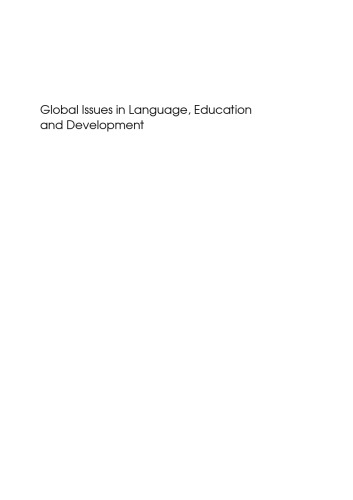

Most ebook files are in PDF format, so you can easily read them using various software such as Foxit Reader or directly on the Google Chrome browser.
Some ebook files are released by publishers in other formats such as .awz, .mobi, .epub, .fb2, etc. You may need to install specific software to read these formats on mobile/PC, such as Calibre.
Please read the tutorial at this link: https://ebookbell.com/faq
We offer FREE conversion to the popular formats you request; however, this may take some time. Therefore, right after payment, please email us, and we will try to provide the service as quickly as possible.
For some exceptional file formats or broken links (if any), please refrain from opening any disputes. Instead, email us first, and we will try to assist within a maximum of 6 hours.
EbookBell Team

4.0
36 reviews
ISBN 10: B01181ZZSG
ISBN 13: 978B01181ZZSG
Author: Naz Rassool
The question of why the issue of language features increasingly at the centre of debates about education for social and economic development at the beginning of the 21st Century is compelling. Within a rapidly changing world, language, literacy and communication are seen as constituting key elements in the process of lifelong learning. Contemporary technological development and cultural shifts intersect in complex ways with the legacy of colonialism and underdevelopment within developing countries with a colonial history. This book addresses some of these issues related to language and development. Part I explores the relationship between colonial and postcolonial social policies on the unresolved language problems that prevail in many developing countries. Part II comprises case studies of Mali, Pakistan and South Africa. Part III draws on key motifs identified in the previous two sections, and discusses linguistic diversity as an important variable of cultural capital within the interactive global cultural economy. The book s focus on language, education and development makes it essential reading in Development Studies, International and Comparative Education, Sociology and Educational Policy Studies. Its focus on language issues within the global cultural economy would make it an important text in Applied Linguistic Studies.
Chapter1 : Introduction
Chapter 2: Content
Chapter 3: Conclusion
Chapter 4: Appendices
Chapter 5: Glossary
Chapter 6: References
Chapter 7: Index
global issues in english language teaching
global issues in education
global issues language and literature
a global language
education global issue examples